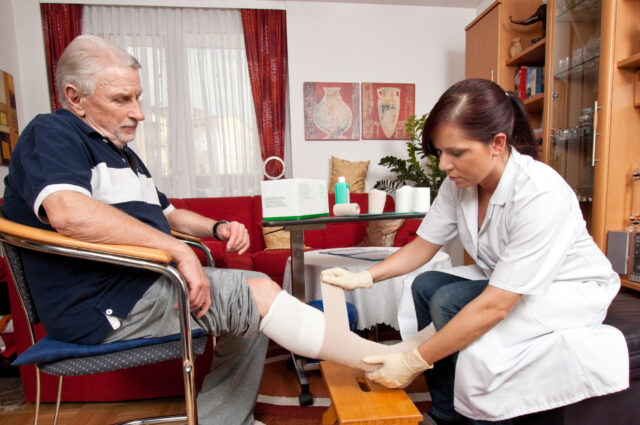
Nurse practitioners occupy what could arguably be considered one of the least political jobs in existence. Responsibilities are infinitely complex and yet simple in motivation.
They’re there to help people feel better. They accomplish this through objective analysis, research, and evidence-based practice.
These are factual concepts that aren’t placed at quite such a high value in the often fraught and emotionally volatile political landscape. And yet, health care is a political priority for people on both sides of the divide.
Working with advocates, nurse practitioners are well-positioned to have their firsthand experience inform policy-making decisions.
How do these changes get made? Let’s take a look.
What Do Nurse Practitioners Do?
That’s a good question and also not one that has a fixed answer. The role of a nurse practitioner will depend primarily on their health care focus.
Most NPs begin their careers as RNs, working with patients in doctors’ offices or on hospital floors. After acquiring experience and determining what areas of healthcare interest them the most, the NP candidate will enroll in graduate school and decide on an area of interest for the future trajectory of their career.
It generally takes 2-3 years for an RN to complete their graduate education and become a nurse practitioner. Once they have done so, they can work with more independence. Sometimes in the hospital setting. Other times—and depending on the requirements of their location—in their practice.
The responsibilities of a nurse practitioner can vary considerably depending on their area of focus.
Some nurse practitioners work with babies. Other nurse practitioners work with adults struggling with their mental health. And, of course, there are many, many jobs in between.
It’s the way that they engage with these responsibilities that unites nurse practitioners across the many different areas of application of their profession. Nurse practitioners are a little like a cross between a nurse and a general practitioner.
And, no, this is not exactly a medically endorsed description, but the responsibilities are similar enough in practice. They work directly with patients and often fulfill bedside duties, but they do it with a higher level of responsibility than standard nurses.
They can often diagnose patients, prescribe medication, and help create long-term treatment plans for people in their care. Family nurse practitioners, in fact, often see patients in place of general practitioners.
It’s interesting, right? But also apolitical. In what way are they able to take their understanding of health care and leverage it to help inform policy?
Nurse Practitioners and Advocacy
Advocacy from a legislative perspective is not a constant requirement of the NP role. In most cases, it’s an elective pursuit.
Nurse practitioners can become advocates directly by engaging with professional organizations that are intent on shaping policy to make it more equitable and comprehensive.
In these cases, they might engage very directly with lawmakers in a capacity similar to that of any other lobbyist.
They may also draft public-facing communications, pamphlets, online content, and interviews with journalists. All designed to explain pressing health care concerns and to advocate for a specific response to them.
Many advocacy organizations will also release materials explaining to the public which political candidates best reflect the goals of the organization.
Of course, an NP wanting to make a difference in their community needn’t pick up political pursuits to be effective. Nurse practitioners advocate in quieter ways for health care equality every day simply by doing their jobs.
At the bedside, they advocate for their patients by taking the time to understand their concerns, their goals, and their struggles. Nurse practitioners often serve as a conduit between the patient and their family or the patient and the hospital itself.
Their goal is to make sure that they are providing people on their caseload with high-quality care that suits their objectives. Naturally, this will look a little different depending on the patient. The goal of most NPs is to understand how to engage with their patients in a way that is personal and effective.
Other Forms of Health Care Advocacy
There are many other ways to contribute to the world of health care without becoming a nurse practitioner. For example, many people considering this career path who might not be drawn to the idea of bedside care might feel more at home in a social work position that is focused on healthcare.
In these jobs, professionals advocate not exactly for specific policy adoption–although sometimes there is that component–but for a wider understanding of relevant medical concepts.
A health care educator may help direct vaccination campaigns or raise awareness to other pressing health care considerations. There are various other ways to make a difference through psychology degrees, administrative roles, or other healthcare functions.
You don’t necessarily need to be at the patient’s bedside to play an important role in their health care journey.
How This Makes a Difference for Patient Morale
The way in which health care advocacy impacts patient morale will, of course, depend on the type of advocacy and the type of patient. In general, however, it’s important to keep in mind that medicine and treatment regimens are only one component of what it takes to make a person better.
Much of a person’s improvement or decline within a healthcare setting depends on their mindset. People who feel good about the care they are receiving tend to respond better to it than those who are doubtful or worried.
Health care advocacy platforms help ensure patients feel seen by their health care systems. Many patients struggle to completely trust their health care systems in a world where care is prohibitively expensive and inequitably distributed.
That makes sense. However, the people who provide that care, the doctors, the nurses, the nurse practitioners, are concerned only with helping people get better.
Advocacy ensures that this remains the focus of care. Patients understand that despite any other obstacles, the people responsible for their care have their best interests at heart.
This helps enormously in how they engage with the health care process. Nurse practitioners genuinely care about their patients.
Advocacy is one of the many ways that they express this.
Disclaimer
The information contained in South Florida Reporter is for general information purposes only.
The South Florida Reporter assumes no responsibility for errors or omissions in the contents of the Service.
In no event shall the South Florida Reporter be liable for any special, direct, indirect, consequential, or incidental damages or any damages whatsoever, whether in an action of contract, negligence or other tort, arising out of or in connection with the use of the Service or the contents of the Service.
The Company reserves the right to make additions, deletions, or modifications to the contents of the Service at any time without prior notice.
The Company does not warrant that the Service is free of viruses or other harmful components












